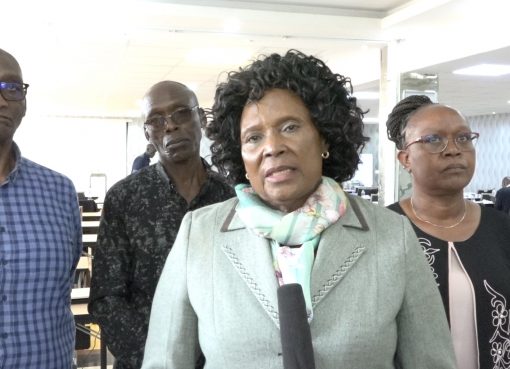The prevalence rate of HIV/AIDS in Kiambu County has declined with figures showing that the rate has dropped from 2.3 percent last year to 2.1 percent currently.
Kiambu County Governor Kimani Wamatangi said that the numbers have dropped from 729 cases in 2022 to 547 cases.
“Even more encouraging is the reduction in mother-to-child infections, which have decreased from 8 percent to 5.5 percent, the Governor said in a speech read on his behalf by the Deputy Governor Rosemary Kirika during the commemoration of World Aids Day in Ndumberi stadium.
Wamatangi noted that HIV-related mortalities have also decreased from 663 in the year 2021 to 502 in the year 2022 and this he added is because of increased identification of people living with HIV through testing, robust awareness campaigns, accessible and increased testing facilities, and community outreach programs.
“We have successfully reached more individuals, ensuring they receive timely diagnosis, care and support which has been crucial in breaking down barriers and stigma associated with HIV and AIDS”, he said.
The statistics, he explained, paint an encouraging picture showing more individuals are taking the crucial step of getting tested each day, an indication to growing awareness.
The increased uptake of antiviral drugs, ARVs, he added is also a significant stride forward, ensuring that those affected have access to vital medication.
“Health education remains a cornerstone of our strategy. We are taking a proactive approach to inform our people about the dangers of HIV, emphasising the importance of regular testing and dispelling myths and misconceptions”, Wamatangi said
He also urged residents to say no to stigma and discrimination, as this is a major barrier to the fight against HIV and AIDS. “It is important to remind ourselves that HIV can be managed and those affected can lead healthy and full lives. Our collective support is therefore crucial”.
The governor also expressed gratitude to the national government for the continued supply of ARVs, a lifeline for those in need.
In a bid to enhance outreach, the governor proposed the continued support for Community-Based HIV prevention interventions such as the improved viral suppression among children and adolescents living with HIV which he noted has been a huge stride forward.
“Through strong collaborations between healthcare teams and partners dealing with orphans and vulnerable children, we have been able to provide comprehensive care, ensuring the young lives receive the treatment and support they need to thrive and live fulfilling lives, “he said.
Wamatangi explained that Data quality and the integration of electronic medical records in various health facilities has been a game changer as it has empowered the county government with insights and analytics necessary for informed decision making and effective resource allocation in the fight against HIV and AIDS.
“My government through the Department of Health Services is also actively implementing the transition of HIV services to the County through a project that spans 2023 to 2025, and is supported by the U.S. President’s Emergency Plan for AIDS Relief and focuses on HIV prevention, care and treatment, targeting four facilities within Juja Sub County, “said the County Boss.
Despite the major progress that the County has made, Wamatangi said all must remain vigilant and resolute in tackling the ongoing challenges that continue to impact people. “HIV and AIDS remains a significant threat to our people, and we cannot afford to become complacent in our efforts,” he said, noting that the prevalence of the disease among youth is particularly concerning.
“The youth constitute the vibrant and productive segment of our society. It is crucial that we persist in our outreach, education and prevention programs to keep these numbers in check,” Governor said
Dr Eddah Mbugua from Health and Research Development (PHRD) in Thika and a part of KEMRI said they are conducting studies at their site and looking at various ways of making HIV care accessible, from the comfort of one’s home to the point that they can have HIV self-test kits delivered to one’s house through online pharmacies.
“This is just to tell us just how everything around HIV is evolving. The other things that we are working on include Peer Pre-exposure prophylaxis (PrEP) the medicine that is taken to prevent HIV, can be introduced to their friends”, she said.
Dr. Mbugua further noted that the other key study that they are conducting is on PrEP to ensure the best way to get medication for all “We are working on how PrEP can be obtained from the pharmacies since currently PrEP can only be gotten and accessed from the pharmacists within the hospitals”.
Emily Njeri, a Health Promoter Volunteer in Kabete Sub County told KNA that working as a CHV sometimes come with challenges especially when dealing with those affected by HIV.
“We meet these people on the ground to talk to them and also link them with health officers but some of them complain that the medicine they take are too strong and requires healthy diet which sometimes is a challenge for them,” she said.
Another challenge they encounter during their visits according to Njeri, is that sometimes they are requested to go with testing kits to the homes since some people do not want to visit the clinics but since it is not possible, they are requesting health officials to be making home visits or even counsellors to talk to the affected.
During the meeting stakeholders were asked to take their young girls of between ages 9 to 14 to health facilities to get the HPV Vaccine as there is a very close relationship between HIV and HPV.
“The HPV virus is the one that is responsible for more than 95% cases of cervical cancer. And because there is a vaccine, this risk can be reduced by more than 95%. So as parents, please let us take our young girls between age 9 to 14 to our health facilities to receive this vaccine. It is free. It should not expire while at the health facilities because it’s something that will benefit us in the long run,” advised Emily Njeri, Health Promoter Volunteer.
According to the Government, Kenya has 1.4 million people who are living with HIV, with 96% of that population being on treatment. Kiambu is ranked 8th with 45,917 people after Nairobi which has 124,609, Homabay 120,600, Siaya 96,297, Migori 76,053, Nakuru 57,635, Mombasa 50,656 and Kakamega 48,733
The National Syndemic Diseases Control Council (NSDCC) in a report says that the country had 18,473 AIDS-related deaths in 2022.
By Wangari Ndirangu





